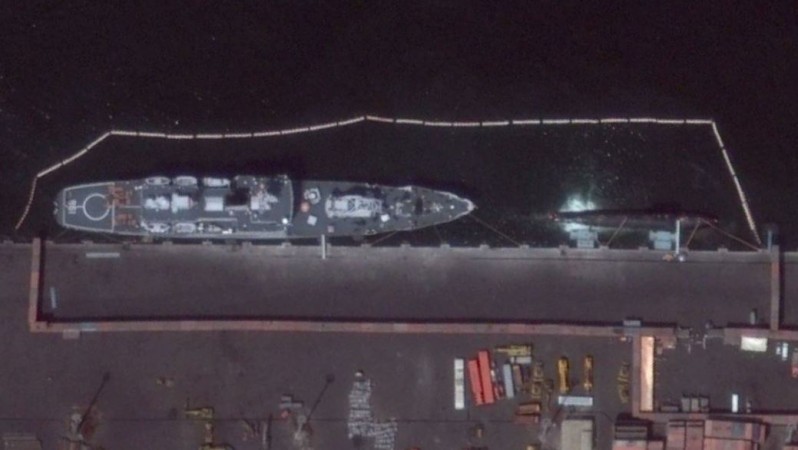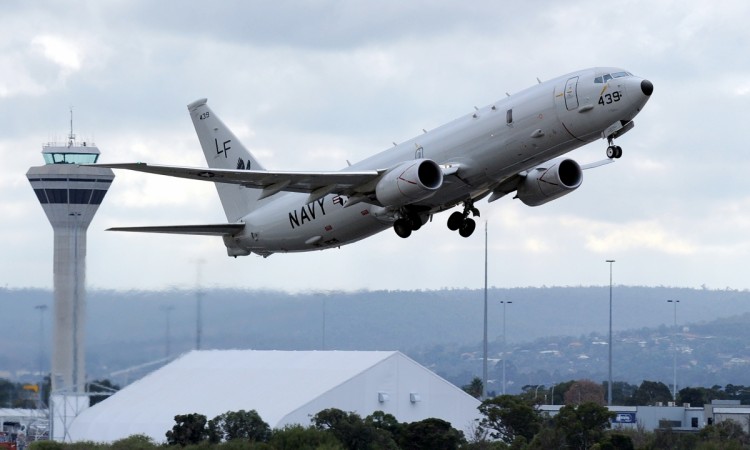By Aditya Bhat

A Chinese nuclear-powered submarine at Karachi harbour, Pakistan.
A new image from Google Earth has revealed the presence of a Chinese nuclear-attack submarine in Karachi, sending the Indian security establishment into a tizzy.
The image shows the Chinese nuclear submarine docked in the Pakistani port city.
The image was first tweeted out by Raj (@rajfortyseven), a satellite imagery expert.
The image was first tweeted out by Raj (@rajfortyseven), a satellite imagery expert.
The Chinese nuclear-powered submarine is said to be of the Han-class, one of the first such class to be deployed by China's People's Liberation Army Navy (PLAN), NDTV reported.
But there are also reports that think it to be a Type 093 Shang-class, the first to enter service in 2006. These submarines are more powerful than the Han-class and said to be on par with the Russian Akula submarines.
But there are also reports that think it to be a Type 093 Shang-class, the first to enter service in 2006. These submarines are more powerful than the Han-class and said to be on par with the Russian Akula submarines.
There are two such boats with PLAN now and it has plans of inducting four more.
Unlike the conventional diesel-electric submarines, nuclear-powered submarines can remain under the water for weeks.
They are are normally loaded with heavy weapons, including torpedoes and anti-ship missiles. Nuclear submarines are also faster than their conventional counterparts.
India is wary of the Chinese presence in Indian Ocean Region (IOR) as the former considers it to be its own backyard and detests any external interference.
China has been expanding its ability to project its naval prowess from the East China Sea to Indian Ocean.
India is wary of the Chinese presence in Indian Ocean Region (IOR) as the former considers it to be its own backyard and detests any external interference.
China has been expanding its ability to project its naval prowess from the East China Sea to Indian Ocean.
China has always maintained that such deployments are to tackle piracy.
This is not the first time that reports have emerged about the presence Chinese nuclear-powered submarines in the IOR or in Pakistan.
In the past, India raised a protest after China docked a nuclear submarine in Colombo in Sri Lanka.
This is not the first time that reports have emerged about the presence Chinese nuclear-powered submarines in the IOR or in Pakistan.
In the past, India raised a protest after China docked a nuclear submarine in Colombo in Sri Lanka.
Indian countermeasures against Chinese submarines

The P-8 Poseidon is an anti-submarine warfare aircraft.
The acquisition of the Boeing P-8Is, a submarine hunter, has been "game-changer" for Indian Navy.
It is a "key asset" in tracking Chinese submarines, the report said.
India has already inducted eight such maritime reconnaissance aircraft and ordered four more planes in July 2016.
The P-8Is also have the ability to engage a detected submarine as it carries torpedoes, depth charges, Harpoon anti-ship missiles and other weapons.
India has also established listening posts in Madagascar, Mauritius and Seychelles in Africa that will help it keeping a track on location of Chinese ships in the region.
The Indian Navy also holds exercises and conducts training sessions for its counterparts in the countries located in the IOR.
Indian naval chief Sunil Lanba had previously said: "As far as People's Liberation Army (PLA) Navy ships and submarines are concerned, the Indian Navy keeps a close eye and monitor their movements. We have maritime domain awareness of the deployment of PLA naval forces in the Indian Ocean region (IOR)... We launch surveillance missions in the form of aircraft and ships to keep a track of them. They had started deployment of their submarines from 2012."
China's "all-weather" friend Pakistan had previously announced a deal to buy eight Chinese submarines, belonging to the Yuan-class.
China recently delivered two Type 035G diesel-electric submarines, with its torpedoes and mines, to Bangladesh.
China is gaining a foothold in India's neighbours, pushing Indian strategic thinkers and planners to come up with a calculated response.
The P-8Is also have the ability to engage a detected submarine as it carries torpedoes, depth charges, Harpoon anti-ship missiles and other weapons.
India has also established listening posts in Madagascar, Mauritius and Seychelles in Africa that will help it keeping a track on location of Chinese ships in the region.
The Indian Navy also holds exercises and conducts training sessions for its counterparts in the countries located in the IOR.
Indian naval chief Sunil Lanba had previously said: "As far as People's Liberation Army (PLA) Navy ships and submarines are concerned, the Indian Navy keeps a close eye and monitor their movements. We have maritime domain awareness of the deployment of PLA naval forces in the Indian Ocean region (IOR)... We launch surveillance missions in the form of aircraft and ships to keep a track of them. They had started deployment of their submarines from 2012."
China's "all-weather" friend Pakistan had previously announced a deal to buy eight Chinese submarines, belonging to the Yuan-class.
China recently delivered two Type 035G diesel-electric submarines, with its torpedoes and mines, to Bangladesh.
China is gaining a foothold in India's neighbours, pushing Indian strategic thinkers and planners to come up with a calculated response.
Aucun commentaire:
Enregistrer un commentaire